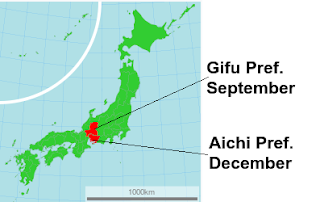 |
| Arrival of CSF |
#13,818
Since last September - and for the first time in 26 years - Japan has been dealing with outbreaks of Classical Swine Fever (CSF), a disease similar to African Swine Fever (ASF), but caused by a different virus (genus Pestivirus, family Flaviviridae).
We've continued to see reports of wild boar infected with CSF in both Gifu and Aichi Prefectures (see Updating Japan's Classical Swine Fever Outbreak), but it's been just over a month since the last farm reported an outbreak (see Gifu Prefecture Reports A 6th Farm Outbreak Of Classical Swine Fever).Today Japan's MAFF (Ministry of Agriculture, Forestry & Fisheries) reports a 7th farm - again in Gifu Prefecture - hit by the virus. The (translated) announcement follows:
Confirmation of suspected affected animals of swine fever in Gifu Prefecture for (7 cases th)
2019 January 29,
the Ministry of Agriculture, Forestry and Fisheries Today, suspected affected animals of swine fever has been confirmed in a pig farm in Gifu Prefecture Kakamigahara.
We are taken all possible measures for the quarantine measures for the disease.
The farm has to refrain from the movement of breeding pigs from the time the suspicion of swine fever has occurred.
Interview in the field, thank you for your cooperation as strictly refrain from such that there is a risk that cause the spread of the disease.
1. Overview of the occurrence farm
Location: Gifu Prefecture Kakamigahara
feeding situation: breeding pigs 127 pigs, fattening pig 1,535 head
2. BackgroundPrior to today's announcement - across 6 Japanese farms and/or agricultural research centers -- the OIE had reported a total of 8,675 swine culled or lost. Farm # 6 in late December was, by far, the largest outbreak with over 7,500 head.
(1) Gifu Prefecture, January 28 (Monday), received reports from the farm of the pig to cough into the pig pen, pig exhibiting heat generation is large, animal health inspectors have conducted a site inspection.3. of future correspondence
(2) the same day, because the suspicion of swine fever is caused by the inspection of in the middle Livestock Hygiene Service Center, was subjected to a thorough examination, today (January 29 (Tuesday)), confirmed that the suspected affected animals of swine fever it was done.
On the basis of the "specific livestock epidemic quarantine guidelines for classical swine fever", and taken all possible measures for the following quarantine measures, and the like.
(1) The farm breeding pigs slaughtered and baked burial, and carried quickly and accurately quarantine measures necessary for setting of the movement restriction zone.4. Other
(2) for the farm of movement restricted area, it will be carried out as soon as possible occurrence status check inspection.
(3) Since the spread of infection prevention, strengthening the disinfection of peripheral generation farm, we set up a disinfection point to the main road.
(4) for the investigation of such infection route, and dispatch the epidemiological investigation team of the country.
(5) aims to ensure the early detection and early notification of the disease.
(6) strive to relevant ministries and sufficient cooperation, producer, consumer, we will endeavor to provide accurate information to the distributors and the like.
(7) thorough guidance on compliance with the Standards of Rearing Hygiene Management of intrusion prevention, etc. to the farm disinfection and wild animals of the farm.
(8) In order to investigate and prevent the spread of such infection route, it will assume all the possibilities investigation.
(1) pig cholera, swine, is a disease of wild boar, it does not infect humans. In addition, it does not meat of infected pigs on the market.
(2) the farm, you have to refrain from the movement of breeding pigs from the time the suspicion of swine fever has occurred.
(3) interview in the field, thank you for your cooperation as strictly refrain from such that there is a risk that cause the spread of the disease. In particular, for coverage of using a helicopter that might interfere with the epidemic prevention work, thank you so strictly avoided.
(4) in the future, so we will endeavor to provide quick and accurate information, so as not to be confused by such relations of production and consumers, such as who is unfounded rumor, thank you for your cooperation.
Today's report should push that number over 10,000.
Last September the OIE withdrew/suspended Japan's hard won status as being free of Classical Swine Fever (see OIE Statement), leaving only 34 countries with that coveted designation.
Even as Japan struggles to contain Classical Swine Fever, they must also worry about the spread of African Swine Fever from nearby China - and like many other Asian nations - are taking steps to try to prevent its import (see Japan MAFF: ASF Virus Detected In Luggage At Hokkaido Airport).
As our world becomes increasingly interconnected, by both trade and travel, the risks of inadvertently spreading agricultural diseases like ASF, CSF, and others are only expected to grow.Even though ASF has never been reported in North America, the potential exists for its arrival from China, Europe, or Africa. Last month the USDA released a new African Swine Fever Factsheet that discusses their preparations for a possible introduction of the virus into this country.
(Excerpt)
Keeping ASF Out
Because of the concern over ASF, USDA recently reviewed and further strengthened its longstanding stringent protections against the spread of the disease.These include:
- Collaborating with states, industry and producers to ensure everyone follows on-farm biosecurity and best practices (including for garbage feeding in states where that is allowed);
- Restricting imports of pork and pork products from affected countries; and
- Working with CBP staff at ports of entry to increase passenger and baggage screening for prohibited products from affected countries.
